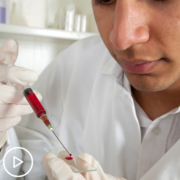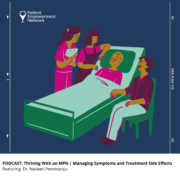How Does Genetic Testing Impact Your MPN Treatment Options?
How Does Genetic Testing Impact Your MPN Treatment Options? from Patient Empowerment Network on Vimeo.
How can genetic testing results impact your treatment and treatment response? Dr. Ruben Mesa provides an overview of common mutations associated with essential thrombocythemia (ET), polycythemia vera (PV) or myelofibrosis (MF) and how identification of these mutations are moving research forward.
Dr. Ruben Mesa is an international expert in the research and care of patients with myeloproliferative neoplasms (MPNs). He serves as director of UT Health San Antonio MD Anderson Cancer Center in San Antonio, Texas. More about this expert here.
See More From the The Path to MPN Empowerment
Related Programs:

|

|

|
Transcript:
Dr. Ruben Mesa:
We are learning much more about the genetics of Myeloproliferative Neoplasm, as we truly are about the genetics of many diseases. First, when I speak of genetics, these are not the genes we think of of inherited genes that are passed from mother and father, to son or daughter. These are the genes in ourselves that potentially can change over the course of our lives, and those changes or mutations can be associated with diseases.
So, what we have learned is that the genetic changes that are associated with myeloproliferative neoplasms are important, both in terms of predicting how the diseases might behave, and also, potentially in terms of therapies. The genetic changes fall into two different groups.
There’s a first group of the most common mutations that we think are important in driving the disease. The most common is the mutation in a protein called JAK2. That’s a mutation in about half of the patients with ET, half with PV – or half with myelofibrosis, and the majority with polycythemia vera. There is mutations in calreticulin. That’s about in a third of patients with ET, and a third with MF. And then, there’s mutations in MPL, which are present in a handful of patients with ET and with MF.
But in addition to those three mutations that tend to be mutually exclusive; patients tend to only have one of those, and there’s a small group of patients that do not have any of those three. But there’s another group of mutations that we have learned about.
That we are able to obtain on panels of sometimes anywhere from 40 to 100 genes that may or may not be changed or mutated in diseases like MPNs and the implications of what those pattern of changes in those mutations have for those patients.










